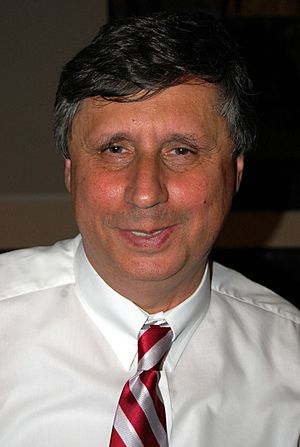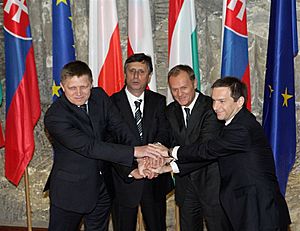Jan Fischer (politician) facts for kids
Quick facts for kids
Jan Fischer
|
|
|---|---|

Fischer in 2010
|
|
| Prime Minister of the Czech Republic | |
| In office 9 April 2009 – 13 July 2010 |
|
| President | Václav Klaus |
| Preceded by | Mirek Topolánek |
| Succeeded by | Petr Nečas |
| Minister of Finance | |
| In office 10 July 2013 – 29 January 2014 |
|
| Prime Minister | Jiří Rusnok |
| Preceded by | Miroslav Kalousek |
| Succeeded by | Andrej Babiš |
| First Deputy Prime Minister of the Czech Republic | |
| In office 10 July 2013 – 29 January 2014 |
|
| Prime Minister | Jiří Rusnok |
| Preceded by | Karel Schwarzenberg |
| Succeeded by | Andrej Babiš |
| President of the Statistical Office | |
| In office 24 April 2003 – 27 July 2010 |
|
| Preceded by | Marie Bohatá |
| Succeeded by | Iva Ritschelová |
| Personal details | |
| Born | 2 January 1951 Prague, Czechoslovakia (now Czech Republic) |
| Political party | Communist Party (1980–1989) Independent (1989–present) |
| Spouse | Dana Fischerová |
| Children | 3 |
| Alma mater | University of Economics |
Jan Fischer (born 2 January 1951) is a Czech politician. He served as the Prime Minister of the Czech Republic from April 2009 to July 2010. During this time, he led a temporary government. Later, he was the Minister of Finance from July 2013 to January 2014. This was also part of another temporary government led by Jiří Rusnok.
Mr. Fischer has spent most of his career as a statistician. He was the head of the Czech Statistical Office starting in April 2003. In 2012, he decided to run for president in the 2013 Czech presidential election. He finished third in the first round of voting in January 2013. This meant he did not move on to the second round.
Contents
About Jan Fischer
Early Life and School
Jan Fischer was born in Prague, which was then part of Czechoslovakia. His father was a scientist who studied math and statistics. He used these skills in areas like genetics and medicine. His mother was also a statistician. His father was a survivor of the Holocaust and was Jewish. His mother was Catholic. Jan Fischer grew up in a family with both faiths and identifies as Jewish.
He went to the University of Economics, Prague. He finished his studies in 1974, focusing on statistics. In 1985, he earned another degree in economic statistics. From 1980 until 1989, he was a member of the Communist Party of Czechoslovakia. This was before the Communist government ended in 1989.
Jan Fischer is married and has three children. His oldest son, Jakub, was born in 1978. Jakub is now a professor of statistics and a dean at the University of Economics, Prague.
His Career Path
After college, Jan Fischer started working at the Federal Statistical Office. In 1990, he became its vice-chairman. He held this job until Czechoslovakia split up. Then, he became the first vice-president of the new Czech Statistical Office. From the early 1990s, he led the team that counted the votes for elections in the Czech Republic.
In 2000, he worked as a production director for a company called Taylor Nelson Sofres Factum. In 2001, he helped the International Monetary Fund look into setting up a statistics office in East Timor. From March 2002, he was a chief of research at the University of Economics, Prague. He was appointed president of the Czech Statistical Office on 24 April 2003.
He is a member of several important groups. These include the Czech Statistical Society and the board of Bruegel. Bruegel is a European group that studies international economics.
Becoming Prime Minister
In March 2009, the government led by Mirek Topolánek lost a vote of no confidence. This happened while the Czech Republic was leading the European Union. Jan Fischer was then suggested to become the Prime Minister of the Czech Republic in April. He was chosen by the two main Czech political parties. His government started on 8 May 2009. The plan was to hold new elections in October.
However, some unexpected events in the Constitutional Court and Parliament delayed the elections until May 2010. Fischer decided to stay in the government until then. He became very popular during this time. He also supported a conference called "Crimes of the Communist Regimes."
Running for President
In February 2012, Jan Fischer announced he would run for president. The election was in January 2013. According to polls, he was one of the favorites, along with former prime minister Miloš Zeman. However, he did not win in the first round. He lost to Zeman and the foreign minister Karel Schwarzenberg. Before the election, some people criticized him for being a member of the Communist Party in the past.
See also
 In Spanish: Jan Fischer para niños
In Spanish: Jan Fischer para niños
 | Chris Smalls |
 | Fred Hampton |
 | Ralph Abernathy |


